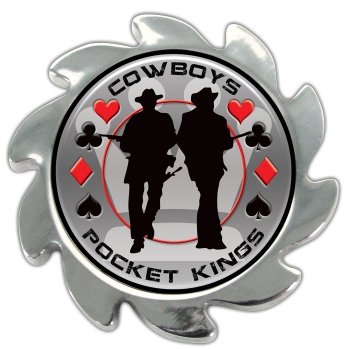Tight spots in poker: pocket Ks in early position

We all love pocket Ks don’t we? After all, kings do indeed make an excellent starting hand, one that’s generally regarded a large pot hand. Ideally, when we pick up Ks we would always love to be in late position, which would enable us to make use of the large pot starting hand exploiting it to its full potential. Sometimes however, that just doesn’t come together. We pick up the Ks all right, but we find ourselves under the gun, in a small pot position stuck with a big pot hand. While the situation isn’t the worst one you can be in at the poker table it isn’t exactly enviable either, because if you don’t know how to deal with it, it can end up costing you your entire stack.
How do you deal with the situation? In order to know what course of action is optimal, you should have solid reads on your opponents, because what you should do greatly depends on the type of player you’re faced with. At any rate, your goal is to take control of the pot. How you do it depends on what you know about your opponents.
Option number one is the open-raise. This is the most straightforward way to play this hand. When you raise from early position, you send out a strong signal that you have a great starting hand indeed. The open-raise generates fold equity for you and it gives you the chance to win the whole thing on a continuation bet. The reason why a continuation bet is successful in this situation a great number of times is that those who call a raise from early position KNOW that they have weaker hands than you and they hope to hit something big on the flop, in order to crack your monster. If they miss (which most of the time they do) they’re willing to fold it if prodded a little through a c-bet. The aim in this situation is to prevent betting from heading down all the way to the river, unless you happen to flop a third K to go with your pocket pair. Unless you hit the monster though, always be aware that an overpair is not a big-pot hand.
If you have the opposition tagged as very loose and reckless, you can take a different approach to your early position pocket Ks: you can limp and then re-raise with them. When action first comes around to you, limp along, and as another player makes a raise, make a large re-raise. The logic behind the move is that a limp re-raise gives away a tremendous amount of strength. Your opponents will automatically assume that you have pocket rockets or pocket Ks and they will be willing to lay down QQ, or JJ. The downside of this approach is however that a very large pot gets built and you’ll be forced to fend for yourself from early position throughout the remainder of the hand.
The limp-call is the exact opposite of the open-raise, and therefore it’s only something that should be used to mix things up here and there.
Regardless of how you play your pocket Ks from early position, playing with rakeback will always remain profitable. Even if you do all the wrong things at the table, rakeback and poker propping will always sweeten the deal a tad.




